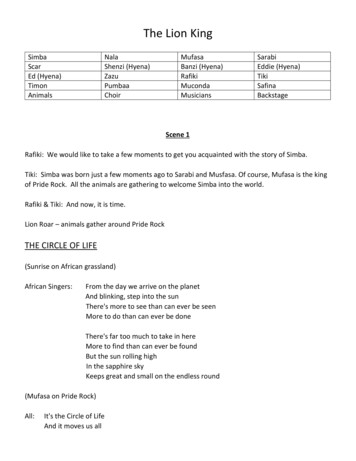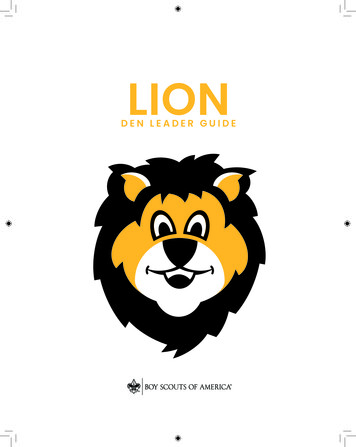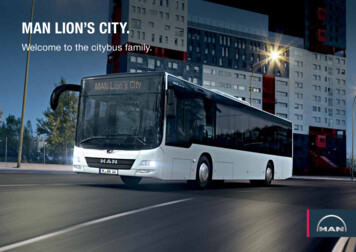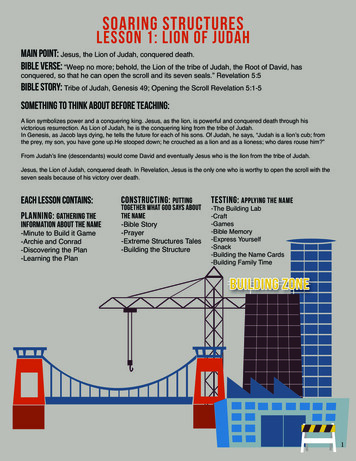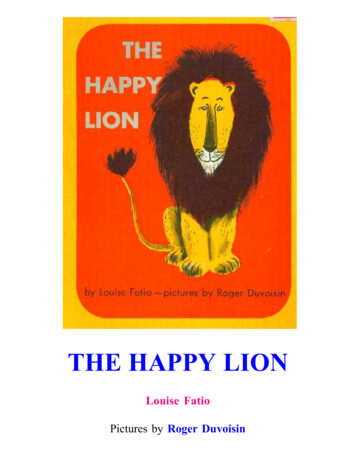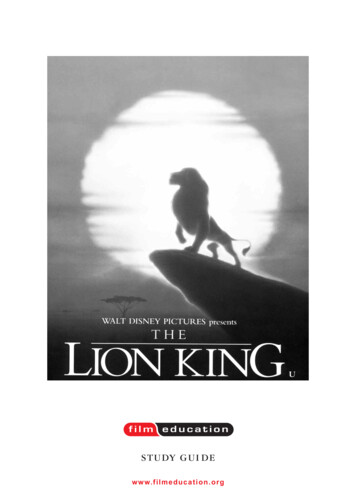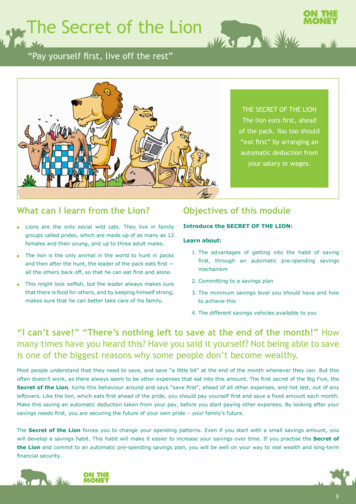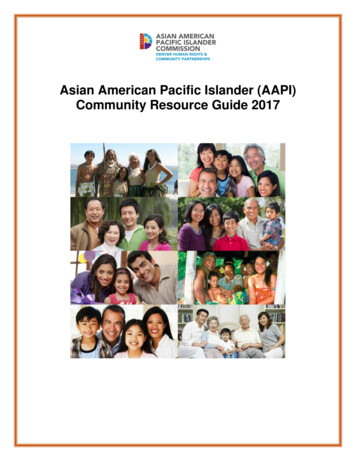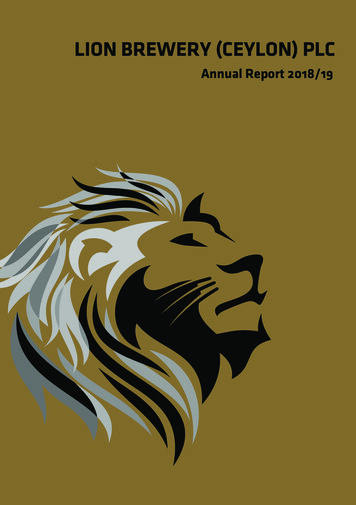
Transcription
LION BREWERY (CEYLON) PLCAnnual Report 2018/19
CONTENTSFinancial Highlights1Chairman’s Message2Chief Executive’s Review4Profiles of Directors11Senior Management Team14Annual Report of the Board of Directors on the Affairs of the Company16Audit Committee Report28Report of the Related Party Transactions Review Committee30Financial Calendar32Independent Auditor’s Report33Statement of Financial Position36Statement of Profit or Loss and Other Comprehensive Income38Statement of Changes In Equity40Statement of Cash Flows42Notes to the Financial Statements44Value Added Statement107Five Year Summary109Statement of Profit or Loss and Other Comprehensive Income - US 112Statement of Financial Position - US 113Notes to the Financial Statements - US 115Five Year Summary - US 116Information to Shareholders & Investors118Glossary of Financial Terms120Notice of Meeting121Form of ProxyCorporate Information123Inner Back Cover
FINANCIAL HIGHLIGHTSIn Rs. '000s20192018Change %42,830,49429,798,01044Profit before finance cost6,247,5804,382,42143Profit before taxation5,313,3243,047,63074Profit after taxation3,220,8801,837,87675Shareholders' funds12,520,7599,411,41333Total assets35,280,78133,402,7256RevenueEarnings per ordinary share (Rs.)Net assets per ordinary share (Rs.)Market 42,032,0006Annual Report 2018/191
CHAIRMAN’S MESSAGEDear Shareholder,On behalf of the Board of Directors, it is withgreat pleasure that I welcome you to the 23rdAnnual General Meeting of the Company.I present herewith the Annual Report for the yearended 31st March 2019, which has been withyou for the required period. The Chief Executive’sreview in the ensuing pages covers the operatingenvironment and the performance of YourCompany in detail and hence I will confine mystatement to an overview.Your Company recorded a turnover of Rs. 42.8billion and a profit before tax of Rs. 5.3 billionfor the financial year ended 31st March 2019.The net profit for the year consequent to the taxadjustments is Rs. 3.2 billion. The results of theprevious financial year cannot be compared asthe operating environment was vastly differentdue to high excise duties which were applicableduring most of the year and the insuranceincome received towards the settlement ofclaims made against damages caused by theflooding in May 2016.The growth in the tourism sector is a key factorfor the performance of your Company thisfinancial year. Tourism recorded a growth of 10%in the year under review to register 2.3 milliontourists. Tourism supports our business and alsooffers higher income generating opportunities forthose employed in this sector either directly orindirectly.It is encouraging to note that Lion Brewery’sexports are continuing to grow at a steady pace.During the year its exports volume grew by37%. We now ship approximately 2 containersof beer a day to 27 countries across the world.Africa has now emerged as our biggest marketovertaking the Maldives. Exports are also madeto new markets in China, Qatar, Fiji, Philippines& Iraq. The initial volumes shipped to China were2Lion Brewery (Ceylon) PLCmodest but offers much potential in the yearsahead. With our presence in 106 resorts, weremain market leaders in the Maldives. Whilstwe make every effort to market a Sri Lankanbeer in a very competitive global landscape, thesupport extended by the authorities towardsthis endeavor is wanting. At the time of writing,export rebate refunds of excise duty amountingto over Rs. 600 million is due to Lion Breweryfrom the Excise Department. These have notbeen reimbursed for a considerable period oftime. Further, exports which were earlier taxedat a concessionary rate of 14% is now taxedat 40% which is the rate applicable to the localalcohol industry.Lion Brewery remains a major tax payer tothe Government. Its contribution in total taxesincluding excise duty, value added tax, nationbuilding tax and income tax is Rs. 31.7 billioncompared to last year’s Rs. 22.9 billion - anincrease of 39%. Similarly, in the case of the beerindustry, on excise duty alone, the contributionto the Government is Rs. 28.0 billion, a rise of29% from the previous year of Rs. 21.7 billion.
In March 2019, an interim dividend of Rs. 4/per share was paid to the shareholders. On thebackdrop of the results for this financial year, I ampleased to propose a further Rs. 6/- per shareto be paid consequent to obtaining necessaryapprovals at this Annual General Meeting.It is with deep sadness that we note the tragicevents which occurred on the 21st of April 2019.We express our condolences to the families thatwere affected and hope they find solace in thesedifficult times. This event has and will continueto have an impact on tourism which in turn willaffect the economy in the near term. We hopethat as a nation we have the resolve to overcomethis bitter experience and move forward withstrength.In May 2019, Mr. Lars Lehmann, formerManaging Director of Carlsberg BreweryMalaysia Berhad, their representative on ourBoard, resigned to take up an appointment asVice President of Carlsberg Eastern Europe. Werecord with much appreciation his contributionto the affairs of the Company and the Board. Wewill miss his forthright and frank discourse onthe various matters of business. We congratulateLars on his new appointment and wish him allsuccess in his new role. We warmly welcomeMr. Theodoros Akiskalos (Ted), Lars’sreplacement, to the Board of our Company.Ted, who has been associated with theCarlsberg Group since 2010, was appointedas the Managing Director of Carlsberg BreweryMalaysia.A quick turnaround of the Company wouldnot have been possible if not for its talentedwork force. Lead by a persevering andresilient Management Team, the workforce hasperformed remarkably well to steer the Companytowards delivering its potential. I acknowledgewith much appreciation the contribution of allemployees in creating & seizing opportunities forthe admirable performance of the Company.A special thank you and a note of appreciationto our partners Carlsberg, our bankers,consignment agents, suppliers, customers andthe loyal consumers for their valuable support &confidence and contribution to the Company’ssuccess.In conclusion I wish to express my deepestgratitude to the Audit Committee, RemunerationCommittee, Related Party Committee,Nomination Committee and to my colleagues onthe Board for their invaluable advice & guidanceprovided to navigate the Company.(Sgd.)D A CabraalChairmanColombo17th June 2019We also welcome Mr. Sudarshan Selvanathanwho was appointed a Non-Executive Directorin April 2019. Whilst welcoming Sudharshan tothe Board we look forward to his contribution intaking our Company forward.Annual Report 2018/193
CHIEF EXECUTIVE’S REVIEWEXECUTIVE SUMMARYWe concluded a satisfactory financial year on31st March. On a turnover of Rs 42.830 bn, wegenerated a pre-tax profit of Rs 5.313 bn. Sincewe are liable to corporate income tax at the highestrate of 40%, post tax profits for the year stood atRs 3.221 bn.On the back of strong growth in tourism and ourexport business, we recorded higher volumes.Costs were diligently controlled with specialemphasis on managing working capital. Since wewere focused on reducing our exposure to financialinstitutions, capital expenditure was relegated tothe back burner. All of these factors contributed toour results.With less than a month left for the financial year toclose, beer taxes were increased by 12.5%. In themeanwhile, excise duty on the major contributorto arrack volumes – Extra Special Arrack –remained unchanged. Taxes on other arrackswere increased by 7.5%. Once again it seemsthat policy consistency is being compromised,an age-old challenge for the private sector in SriLanka. Ostensibly, the tax on Extra Special Arrackremained unchanged since it was the “poor man’s”drink. Thus, it would seem that it is governmentpolicy to get the “poor man” to imbibe high alcoholbeverages rather than those with a lesser alcoholcontent. This is a rather unusual policy measure, tosay the least.BUSINESS & ECONOMIC ENVIRONMENTThe year was marred by a turbulent politicalenvironment & a steeply depreciating currency.Both had an adverse impact on business &consumer confidence.The Country’s economy grew at a modest 3.2%in 2018. The agriculture sector which had twodifficult years due to prolonged drought conditionsbounced back to record growth of 4.8%, thanks4Lion Brewery (Ceylon) PLCto a good monsoon. Since close to 30% of theCountry’s population is engaged in agriculture for theirsustenance, a good harvest pumps money into theeconomy and has a positive impact on the FMCGcategory. The industrial sector recorded marginalgrowth of just 0.9%. In the meanwhile, the servicessector grew by 4.7%. With economic growth wellbelow the country’s potential, it was not surprisingthat discretionary expenditure was curtailed. Underthe circumstances, it was no surprise that the FMCGcategory contracted by almost 8%. All sub sectorswithin the FMCG category declined with F&B beingthe most affected at 9.6%.In a challenging economic environment, Tourismcontinued to be the star performer recordinggrowth of 10.3%. 2.33 million tourists visited thecountry in 2018. Growth in this sector is beneficialto our business as tourists in general consumemore of our brands per person than do locals.There was month on month growth in arrivalsthroughout 2018 and this was reflected in our salesin the areas frequented by tourists.The LKR depreciated sharply – i.e. by 17.6% against the USD in 2018. The depreciation of thecurrency against the Euro was marginally sharperat 18.2%. This led to an increase in costs of allimported items including our most commonlyused input materials. The impact of the currencydepreciation to our bottom line was significant.The depreciating currency exerted pressureon inflation as well & compromised consumerspending particularly in relation to non essentialproducts. Clearly, the sharp depreciation of thecurrency eroded both business and consumerconfidence. The political uncertainty that prevailedduring the period 26th October to 16th Decemberexacerbated the depreciation of the currency.THE ALCOHOL INDUSTRYThe political uncertainty that prevailed during thelatter part of 2018 meant that the National Budgetwas postponed to early March of 2019. As a result,
we had almost a full year of stable taxation acrossthe alcobev industry. However, when the budgetwas finally announced, it took us by surprise;firstly because there appeared to be a shift in thetax policy and secondly because of the extent ofthe tax increase. Beer taxes were increased by12.5%. This was a significant increase under anycircumstances but particularly so considering thedifficult economic conditions in the country. Moreimportantly, it was only the beer industry that wassingled out for the tax increase. The arrack industryescaped mostly unscathed since taxes on the socalled extra special variety – which accounts forapprox. 80% of its volume – remained unchanged.Ostensibly, this was because arrack is the “poorman’s drink”. Its unfortunate that government seesno dangers in positioning high alcohol productsas the drink of choice for anyone leave alonethe underprivileged. This flies in the face of wellestablished & proven alcohol policies world wide,all of which are based on the premise that lowalcohol products are far less harmful than thosewith a higher concentration.The modification of the tax system in thismanner has once again led to concerns of policyconsistency. The Sri Lankan private sector hasbeen plagued with policy inconsistency fordecades with the alcohol industry being at thereceiving end more than most. Under such anenvironment, businesses find it difficult to planfor the future and investment decisions are madeharder. We call upon policy makers to implement aformula - indexed to a suitable data point -throughwhich future excise taxation is determined. Thisbrings certainty to the industry and will allowbusinesses to make decisions without fear ofunpleasant surprises.We are made to understand that the Governmentintends to implement a “fool proof” system toprevent tax fraud at the point of manufacture.This is certainly a timely initiative and we stronglysupport the introduction of a sound, modernsystem that prevents tax evasion by manufacturers.If the system is to deliver the expected results,it is essential that its supplier is a well reputedAnnual Report 2018/195
CHIEF EXECUTIVE’S REVIEWorganisation. Irrespective of the technology used,we call upon the government to bear the cost ofthe system. We ask this for four reasons; firstlythis is a system deployed to protect government’srevenue and hence logically, should be paid forby government as the beneficiary. Secondly,government is likely to increase its revenuesignificantly as a result of the “fool proof” systemwith some estimates being as high as Rs 40bn.The cost of the system across all manufacturers isnegligible in comparison to the potential revenueincrease and thus, could very well be absorbedby government. Thirdly, if the government were tobear the cost in its budget, there will be oversightover those responsible for procurement. If onthe other hand, the cost is passed on to themanufacturer, those responsible for procurementwill feel no compulsion to keep the purchase priceunder control. Oversight over procurement will alsoreduce opportunities for manipulation betweensupplier and those responsible for procurement.Finally, if the cost of the system is transferred to themanufacturer, this can become another tax, if notimmediately, sometime in the future. Considering allof the above, we call on the government to absorbthe cost of the proposed system.For many years we have highlighted the harmthat is being caused by the so called toddy inthe market. The Excise Ordnance defines toddyas “fermented or unfermented juice drawn fromany coconut, palmyra, kittul or other kind of palmtree”. However, it is unlikely that the majority oftoddy available in the market on a commercialscale fits this definition. Today’s toddy is an artificialconcoction which is said to be made from asubstance known as “Ceylon Paste”. Apparentlysynthetic urea is also used in the production oftoddy. Common sense suggests that productsmade in this fashion are harmful to consumers.Yet, regulators – who are required to be on site atproduction facilities on a 24/7 basis - are turninga “Nelsonian” eye on these practices for reasonsbest known to them.6Lion Brewery (Ceylon) PLCIn recent times, a product pretending to be a Sakehas been introduced to the market. The term Sakeis used to describe a traditional Japanese alcoholicbeverage produced from rice using a process akinto brewing a beer. The term Sake can be usedonly if this very specific process is followed. Wetrust that the regulator has ensured the correctprocess being used prior to approving the productfor sale. More importantly, this product carriesan alcohol content of 12.5%. Using an anomalyin the existing regulatory framework, the producthas been approved under a tax slab of Rs 600per liter of pure alcohol. In its presentation, theproduct imitates a beer. Yet, in alcohol terms beeris restricted to an upper limit of 8.8% and attractsa tax of Rs 2,700 per liter of pure alcohol. Thus wehave a product with 42% more alcohol attractingjust under a fifth of the tax levied on a competitorbrand. This is certainly not a level playing field andwe call on the authorities to correct this anomalyexpeditiously.During the financial year under review, the beerindustry’s contribution to government revenueincreased by 29%. When VAT is added on, thecontribution would be even more. At the sametime, we see consumers drinking better i.e movingfrom hard to soft alcohol. Empirical evidencealso suggests that illicit liquor consumption hasreduced somewhat; a result of both the excisetax reforms in 2017 & better enforcement byspecial units of the police force. Thus the excise
tax reforms introduced in November 2017 haveproved successful & we call upon the authoritiesto consolidate the gains achieved by implementinga suitable tax formula as referred to in a precedingparagraph.SALES AND MARKETING OF BEER IN SRILANKAThis year we focused on consolidating our positionwithin the country’s alcobev segment. In theprevious year we revamped the imagery around theLion portfolio. The objectives were two fold; firstly,we wanted the Lion portfolio to have the look andfeel of modern global brands so that they couldcompete with the best anywhere & secondly, wewished to strike a balance between an umbrellabranding concept whilst still allowing the threevariants – lager, strong & stout – to express theirindividuality and connect with their respectiveconsumers and be relevant to them. With the newimagery in place & supported by a reasonable taxregime, we set about clawing back the groundwe had lost since October 2015 (firstly, due to adubious tax increase foisted on the beer industryand secondly, the floods that inundated us within6 months thereafter). The Ryder’s brand whichbrought a new energy & vitality to the beer industryalso helped us in this process. The results asreflected in our volumes suggests very strongly thatwe succeeded in our endeavours.Lion was listed as the most valuable beveragebrand in the LMD Brand Finance annual brandrankings for the year 2018. Overall, it ranked asthe 9th most valuable brand, the same positionthat it occupied in the previous year. This meantthat brand Lion was once again ranked secondin the FMCG category with a globally renownedmultinational brand taking the top spot. Thata brand legally restricted in communicatingwith its consumers could claim such a positionin competition with those that have no suchconstraints says much for its underlying strengths.EXPORTSIn the financial year under review, we exporteda total of 705 containers, an increase of 37% incomparison to the previous year. This translatedinto a revenue growth of 48%. In terms ofdestinations, Lion beers now reach 27 countriesacross the 5 continents.We remain market leader in the Maldives. In NewYork we continue to build our brand image andLion Stout is listed in several high profile bars &restaurants in that city. In some instances, LionStout is the only non US beer listed in the outlet;an indication that the brand is gaining tractionin that market. Africa and the Middle East havebecome lucrative markets for us and we aim tobuild a strong business in these regions. During theyear, we entered 5 new markets, namely, China,Qatar, Fiji, Philippines, and Iraq. Exports to Chinacommenced at the end of the year under reviewwith an order of 24 containers. Whilst it is still earlydays, we are hopeful that China will turn out to bea significant market for us.The exports business whilst being small incomparison to our local sales, is of strategicimportance as it acts as a buffer againstinconsistent & unfair policies at home. We aregradually starting to invest behind our brands &distribution systems in overseas markets. We havepersonnel on the ground in New York in an effortposition our brands appropriately and to drive upsales volumes. Soon we will expand this strategyto other select markets. These are investments wemust make to hedge against regulatory changesin Sri Lanka although in the short term, suchinvestments will appear somewhat difficult to justify.Whilst we have made every effort to grow ourexport business, it is unfortunate that both policyand regulatory frameworks don’t support thisendeavour. From a policy perspective, profits onour exports no longer attract the concessionaryAnnual Report 2018/197
CHIEF EXECUTIVE’S REVIEWincome tax rate of 14%. Instead they attractthe “sin tax’ rate of 40%. From a regulatoryperspective, we are faced with every possiblebarrier when attempting to grow our exportsbusiness. The excise procedures that need tobe followed when fulfilling export orders arecumbersome and are a case in point as to whySri Lanka is placed so low in the World Bank’sease of doing business ranking. Excise taxes paidon production and refundable once brands areexported, lie with the regulator for months. At thetime of writing, more than Rs 600 mn is due asexcise duty rebates on beer exports since January2019 todate. This is certainly not an incentiveto export. The need is to encourage exportsnot hinder the effort. However, no attempts aremade by the regulator to streamline processeseither proactively or reactively. Clearly, these arenot reflective of the country’s need to promoteexports. Policies, the regulatory framework and thebureaucracy must all be aligned to the objectiveof promoting exports if we as a country are tosucceed in this endeavour. In this connection,we appeal to the authorities to extend theconcessionary tax rate of 14% to all export profitsand to implement business friendly processes inorder to facilitate exporters.SUPPLY CHAINDuring the financial year we were recertified for ISO22000, ISO 14001 & OHSAS 18001 standardswhich relate to Food Safety, Environment &Occupational Health & Safety respectively.These standards give us a strong foundation forquality and governance within the productionenvironment. For instance, customer complaintsare now down to 3.4 defects per 1.3 million units,well within six sigma norms.From an operational perspective, we focused onreducing our cost of production by driving efficiencies.Due to these efforts, we had significant savingsthrough the reduction of wastage in the brewingand bottling processes and substantial reductions inthe consumption of energy and water. Bottling lineefficiencies were also driven up significantly.8Lion Brewery (Ceylon) PLCAs part of our efforts to protect the environment,we recovered approx. 4.5mn kgs of CO2 duringthe financial year. A significant amount of therecovered CO2 is used back in the productionprocess. Rather than venting the remainder into theair, we now have an avenue to commercialise theexcess thereby generating an income of approx.Rs 65 mn during the financial year.SUPPORT SERVICESIn October 2018 all staff participated in a programaptly titled “Discover the Lion in You”. This was atailor made program that aims to bring out latentstrengths & talents of individuals and to forgestronger teams across the business. This wasfollowed by two others, also tailor made, namelythe Management Development Program and theExecutive Development Program. The first is of9 months duration and upskills employees in theMiddle & Assistant Manager grades. The secondis a 6 month course which helps executives andsupervisory grades to perform their current rolesmore productively whilst also preparing them formore responsible positions in the future.On the information technology front, our operations& data centre were recertified for ISO 27001:2013.Each year, we continue to migrate more processesinto our ERP system, SAP and this year was nodifferent. During the year, we started work on amajor IT project, i.e to migrate our systems to SAPS/4HANA. With this migration - which will takemore than half of the on-going financial year - allour systems will be on the cloud.
OPERATING RESULTS & FINANCIALPOSITIONTurnover for the year grew by 44% to Rs 42.830billion whilst Pre-tax profit stood at Rs 5.313billion. Whilst overall expenditure increasedreflecting the higher volumes and greater numberof transactions, on a per case basis costs reducedsignificantly. Net finance costs reduced by 30%and amounted to Rs 934 mn. Liability to incometax & deferred tax amounted to Rs 783 mn and Rs1.309 bn respectively leaving Rs 3.221 bn as profitafter tax for the year.Our balance sheet improved during the yearwith net borrowings reducing to Rs.2.211 bnreflecting a gearing of 15%. At the start of thefinancial year, gearing stood at 45%. Whilst mostbusinesses operate at higher gearing levels, thepolicy inconsistency that has shadowed the beerindustry over many years cautions us towards amore prudent path. Working capital managementreflected a marked improvement as well with inputmaterials, finished goods & debtors all being belowbenchmark norms.Net assets per share at the conclusion of the financialyear stood at Rs 153.72 an increase of 31.2%. Thetotal net asset value of the company in its booksamounted to Rs.12.521 bn at the close of thefinancial year whilst its market value on the day stoodat Rs. 44.400 bn. The value of our share increased by6% to Rs. 555/- at the close of the financial year.TAXATION“standard” rate of 28%. We call on the authoritiesto reconsider this so called “sin” tax & bring itin line with other corporates, since the alcobevindustry pays a substantial component of itsrevenue in the form of excise duty.During the financial year we reversed accumulatedtax assets to the income statement. These taxassets arose as a result of tax losses incurred inthe year of the flood. However, since we havenow returned to profitability, these tax losses werefully utilised in arriving at the taxable income ofthe year. Since the tax losses were fully utilised,the corresponding tax asset no longer existsand hence had to be reversed into the incomestatement.RETURNS TO SHAREHOLDERSIn March 2019, Your Board declared an interimdividend of Rs 4 per share. A further Rs 6 pershare has now been proposed by Your Board forapproval by shareholders at the AGM. If approved,the total distribution for the year will amount to Rs10 per share or Rs 800 mn in terms of the cashoutflow. This is a 250% increase over the previousyear and is almost 25% of our post tax profit forthe period under review.THE YEAR AHEADAt the time we closed operations for the traditionalNew Year period in April, we were confident ofsurpassing the results of the year under review.Unfortunately, we are no longer as confident as weDuring the year under review, our contributionto government revenue amounted to Rs. 31.747bn. This is an increase of 39% over that of theprevious year.NBT which was previously not levied on thealcobev sector, was introduced w.e.f. 30th July2018. This added further cost and complexityto an industry already weighed down with anoverwhelming tax burden. An example of this iscorporate tax which at 40% is 43% higher than theAnnual Report 2018/199
CHIEF EXECUTIVE’S REVIEWwere then due to the tragic events that took placeon Easter Sunday. It was a dark day for Sri Lankafrom many perspectives; many innocent liveswere lost, scores of people were injured, propertydamaged, the efficacy of our intelligence systemswere called into question as were our politiciansand the economy took many steps back.Tourism was the worst and most immediatelyaffected. Scores of foreign visitors left the Countryimmediately and hotel occupancy dived to the lowsingle digits. Those depending on tourism for theirlivelihood – from vegetable suppliers to guidesto serve staff – are all deep in financial difficulty.FMCG businesses with exposure to the tourismindustry and its dependents – including us – willfeel the impact of the downturn during the ongoing year.The Sri Lankan economy has been well belowits potential in the preceding few years. TheEaster Sunday attacks are likely to slow down theeconomy even further in the on-going financialyear. Consumer spending power is likely to becompromised and businesses such as ours will bethe first to feel the impact.Before the close of the on-going financial year,we are likely to experience two major elections,the Presidential & the General. Elections of thismagnitude always lead to an unsettled operatingenvironment & this year will be no different.On a more positive note, the currency hasstabilised and has gained ground since the closeof the year under review. In terms of interest rates,efforts are being made to make them more investorfriendly.All in all, we feel the year ahead to be one fullof challenges driven mainly by the operatingenvironment. However, the Lion team isdetermined to make the best of the circumstanceson offer.10Lion Brewery (Ceylon) PLCCONCLUSIONWe had a satisfactory year. Our volumes grewas did market share in both the beer & alcobevcategories. We gained efficiencies in the brewingand packaging processes, reduced waste inmany areas whilst commercialising in some.Our distribution systems functioned remarkablywell responding to changes in the market placewith dexterity & effectively. Effective utilisationof installed capacity pushed back the need forcapex which together with sound working capitalmanagement resulted in a significant reduction innet borrowings. In short, we finished the financialyear in a much stronger position than when westarted it.We must make special mention of Lion’s seniorteam. They went through a remarkably tough twoyears between November 2015 and November2017 and have emerged stronger, more committed& determined than ever before. The experiencesof those two years have bonded the team as notraining program ever could and the outcome is theresults reflected in the financials of the year underreview. But it’s a team that will not rest on itsachievements. Instead it will continue to seek newopportunities & position our business to reach itsfull potential in the years ahead.Lion is a strong company. We have truly greatbrands, a razor sharp route to market, state ofthe art technology & a remarkable team. Givenan appropriate alcohol policy that is consistentlyapplied, Lion should be stronger tomorrow than itis today.(Sgd.)S. K. ShahChief Executive OfficerColombo17th June 2019
PROFILES OF DIRECTORSAMAL CABRAALSURESH SHAHMr. Amal Cabraal is presently the Chairman of CeylonBeverage Holdings PLC, Lion Brewery (Ceylon) PLC,Silvermill Investment Holdings and CIC Feeds Group ofCompanies. He is a former Chairman & Chief ExecutiveOfficer of Unilever Sri Lanka and has over 3 decades oflocal and international business experience in generalmanagement, strategy development and marketing &sales management.Mr. Suresh Shah is a Director and Chief
Annual General Meeting of the Company. I present herewith the Annual Report for the year ended 31st March 2019, which has been with you for the required period. The Chief Executive's review in the ensuing pages covers the operating environment and the performance of Your Company in detail and hence I will confine my statement to an overview .
